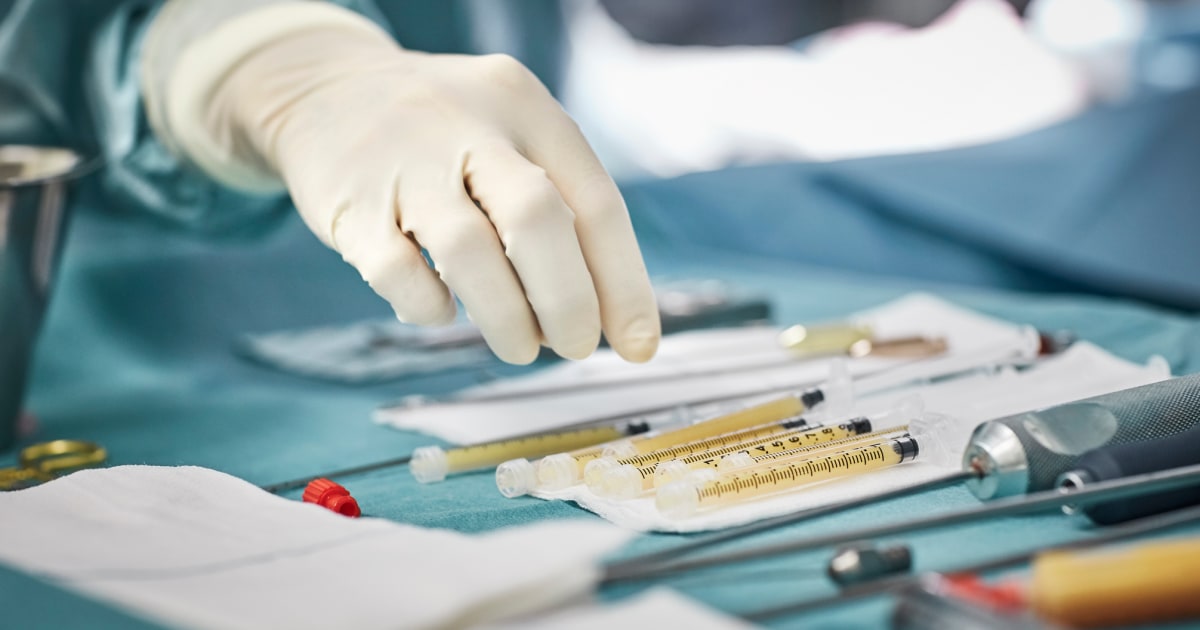"Not having an ass" was a complex that Míriam Parralo, 28, had always dragged.
After years of saving, shortly before the pandemic began, she collected the 8,000 euros that she needed for an aesthetic operation with which she wanted to implant fat around her buttocks to gain the volume that she does not have naturally: “I was very excited, but I did the foolish thing, I regret it a lot”.
His operation went wrong.
She was “convinced” to get synthetic implants instead of the fat and now one of them is moving.
"I'm totally deformed."
She is a worker, single, with a child, she does not have the money to file a lawsuit against the clinic or to undergo another surgery to fix the problem.
“Before the intervention I was hardly informed.
They told me the typical thing, that the implant could burst, but little else.
Nothing to do with what happened, ”she assures.
In many low-price clinics, those who inform the patients, or rather clients - around 85% are women - are salespeople, often without health training, and those who undergo the operation have no more than a brief encounter with the surgeon.
This, together with aggressive commercial promotions and a growing and massive exposure to models of unreal beauty, especially through social networks and in increasingly younger generations, is leading to a trivialization of cosmetic surgery, according to professionals, medical societies and experts.
More information
Cosmetic surgery became a nightmare in Cartagena: "He arrived at the hospital without blood and with many perforated organs"
"There are people who think they are going to the hairdresser, and do not understand that there can be complications in a surgery," says plastic surgeon Diego Tomás Ivancich.
“The patient is unprotected and overwhelmed by offers more focused on 2x1, for a limited time or, 'If you operate, your friend will do it for free.'
They are aberrations, we are not selling sweaters”, complains José Luis Vila, president of the Spanish Society of Reconstructive and Aesthetic Plastic Surgery (SECPRE).
"I never thought that my profession could be trivialized so much, that it could become a real business that interests companies with the smell of money and that go to the bottom line above the patient's well-being," laments Moisés Martín, a plastic surgeon with more than 30 years of experience and member of SECPRE and the Spanish Association of Aesthetic and Plastic Surgery (AECEP).
Surgeries that don't go well
Errors in operations are not the norm, but they are not completely extraordinary either.
It is inevitable that they will grow due to the proliferation of
low cost
clinics , where medical professionals who do not have a specialty in plastic surgery often operate, and the enormous growth in the number of interventions.
In a decade, surgeries have almost doubled in Spain: from 119,637 in 2010 to 221,935 in 2019, according to data from the International Society of Plastic and Aesthetic Surgery (ISAPS).
In its latest report, which analyzes 2020, the figures fell as a result of the pandemic (165,906), but it estimates that it will return to previous levels and continue to rise in the coming years.
With these figures, Spain was the eleventh country with the most procedures during the year of the pandemic;
the first three places were occupied by the United States, Brazil and Germany, and behind Spain were Greece, Colombia and Thailand.
Yolanda Cabrera, doctor in Audiovisual Communication and professor at the University of Valencia specializing in gender and stereotypes, explains that this may be due, in part, to the fact that “the networks have aggravated the pressure on the tyranny of the image, there is social overexposure and exhibitionism who also does not value the same in them as in them, especially the younger girls, where there is a hypersexualization.
Pressure "to adapt to the canon" with decisions whose results sometimes do not turn out well.
There are no official data on failed aesthetic interventions.
The Patient Advocate Association collects every year the complaints that come to it, which are far from all there are.
Last year they were
251 cases of people who underwent plastic, reconstructive and aesthetic surgery with unsatisfactory results.
“And this year they are growing.
There are more and more”, says Carmen Flores, its president.
Vila, the president of the SECPRE, calculates —”unofficially”— that 98% turn out well and 2% present some complication.
The deaths that recently occurred to Silvia Idalia, a girl who suffered an infection, or Sara Gómez, a woman who underwent liposuction in Murcia in December by a cardiovascular surgeon, are “very rare”, according to him.
"It's like the plane: there are hundreds of thousands of flights a week and nothing happens, but accidents also occur," he compares.
professional intrusiveness
The SECPRE denounces an enormous intrusion.
He estimates that up to nine out of ten doctors who practice cosmetic surgery do not have the official specialty of plastic surgery.
It is the one obtained after completing the corresponding MIR, as happens with any other.
But in Spain a 1956 law is still in force that allows all graduates in Medicine and Surgery to operate on anything.
“What has been happening in recent years is a proliferation of doctors without qualifications who take weekend courses, month-long master's degrees and some of them blended learning.
They hang it on the wall and the poor patient believes that she is in front of a specialist, ”says Vila.
Isabel Moreno Gallent, president of AECEP, acknowledges that it only depends on the ethics of each professional to decide whether to perform certain surgeries.
“I would be incapable of operating a cataract on a patient.
For a master's degree of four months or four weekends no one can be endowed with knowing what to do in an operation if complications arise.
We emphasize that patients are well informed before choosing a clinic”, she insists.
In some, Ivancich says, they hire practically newly graduated doctors who are paid very little money.
"They are cheap and it helps them to make hands, gain experience," he says.
He also clarifies that a complication is not the same as negligence or an unexpected result.
"I always tell my patients that I operate, but they heal," he sums up.
A 2016 Supreme Court ruling states that "plastic surgery does not carry a guarantee of the result."
It is something “intolerable”, in the opinion of Carmen Flores, of the Patient Advocate: “If you hire some workers to leave you a wonderful house, they cannot destroy it.
And this is what sometimes happens with cosmetic surgery, in which healthy people come out much worse than they entered.
Surgeon Diego Tomás Ivancich invites anyone undergoing an intervention to think about why it can be so cheap: “No one gives four pesetas hard.
They save on materials, on salaries, on facilities, they do not leave the optimal admission time after the intervention, they put a single anesthetist to attend to two interventions at the same time or they perform several at the same time, something that I would never do because it increases the risk of complications”.
The most frequent operation, the breast implant, can be found in offers from some clinics from about 2,000 euros, a procedure that is usually around 5,000 and can reach more than 8,000 in the most expensive centers.
Delve into Esther Pineda, doctor in Social Sciences and author of
Bellas para muerte.
Gender stereotypes and aesthetic violence against women,
that "the democratization and cheapening of plastic surgery and other aesthetic procedures has contributed to its massification, ceased to be a privilege of those who had greater purchasing power to be available to any woman, even of low resources".
He talks about 2x1, the "bring a friend and it's cheaper", packages that offer surgeries in other countries where they are less expensive and that include airfare, stay and surgery, promotions in which if you perform two surgeries a same day the third one is free, sweepstakes for surgeries on social networks and other practices.
But that is part of the commercial policy of some clinics.
Francisco Menéndez Graiño, a plastic surgeon with more than 40 years, regrets that these centers are not managed by doctors, but by businessmen: “Ours is not a business, it is a profession”.
Although those consulted point to low-cost clinics, they are not the only ones that share certain practices.
Macarena (fictitious name of an affected person who prefers to remain anonymous) suffers from serious after-effects after an abdominoplasty that did not go well in a center "not cheap and very reputable".
“I was not deceived, but I was trusted by how they sold it to me.
I only spoke 10 minutes with the surgeon and they did not explain anything to me.
They assured me that it was very easy, that she was going to be divine.
I told them that I was going to think about it and at the same time they called me to ask me if she encouraged me, that it would be great, ”she says.
Many companies hide behind the informed consent that patients sign, but many times without even reading it.
"There are several pages with tiny letters, they give it to you to sign while an employee is talking to you and you don't know anything",
Retouched skin, enlarged eyes, eternal youth: aesthetic violence
To be “divine”, to be “great”.
Clinical psychologist Aurora Gómez, an expert in digital behaviors, explains that "what is normal [what we think is normal] is what we see most often."
What do teenagers watch most often?
"A lot of
input
through Instagram, a brutal presence of those retouched skins, those enlarged eyes, that eternal youth."
That begins to be "normal" and "they begin to modify their own body perception."
Gómez indicates the “somatoform disorder” that can be produced by the continuous consumption of unreal beauty: “They generate an altered perception of themselves, the filters on the street do not exist and the only way to achieve that perfect image is with surgery, within a society with a cult of beauty and the body from which a lot of money is made”.
And that is part of what the sociologist Esther Pineda defines as "aesthetic violence."
What it is “is the set of narratives, representations and practices that exert pressure and forms of discrimination on women to force them to respond to the canon of beauty;
social pressure that has physical and psychological consequences on women and that is based on four premises: sexism, gerontophobia, racism and fatphobia”.
The Victoria's Secret window display on London's Bond Street in July. Mike Kemp (Getty Images)
The demand for "femininity, thinness, whiteness and youth has been maintained over time, and currently the way in which aesthetic violence is exercised has increased and become more widespread," explains Pineda, due to this overexposure to the canon and, at the same time, "the evaluation and judgment have been deepened": "Before these comments could be received by family members, friends, partners, study or work colleagues, but now our bodies are constantly exposed to the evaluation of infinity of people known or not through social networks”.
As feminism grows and spreads, so do stereotypes and the bombardment of aesthetic perfection.
Pineda argues that "the questioning and problematization of aesthetic violence, plastic surgery, or the modification of the image through digital media does not mean that women's freedom to choose over their bodies is being taken away or curtailed", but that “they have sufficient information, that they know that there is nothing wrong with their bodies, that it is not an individual problem as the beauty industry has led us to believe so that we can consume their products and services”.
While this substantive debate is taking place, societies have been fighting for years for better regulation of these practices.
At the return of summer, the PSOE will present a non-law proposal in Congress that will put order in cosmetic surgery.
It focuses on three fronts: that a qualified doctor always carry out the interventions, a regulation of advertising and another of informed consent that includes the specialty of the doctor who operates.














